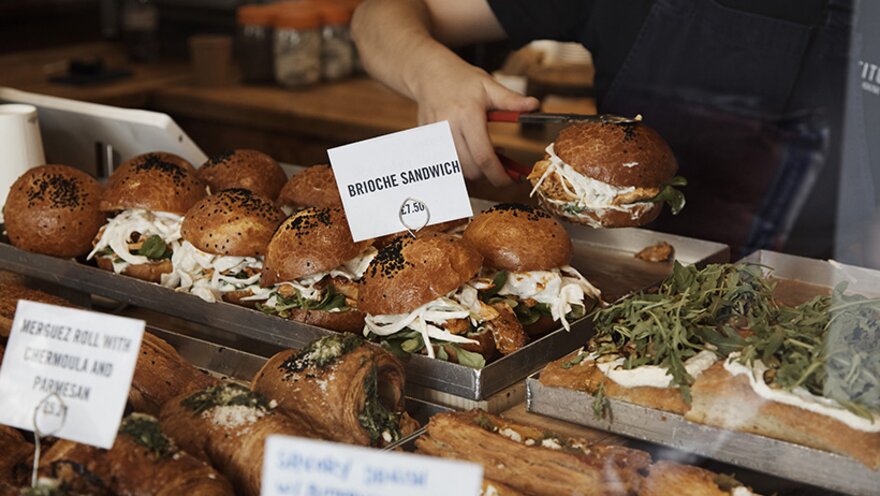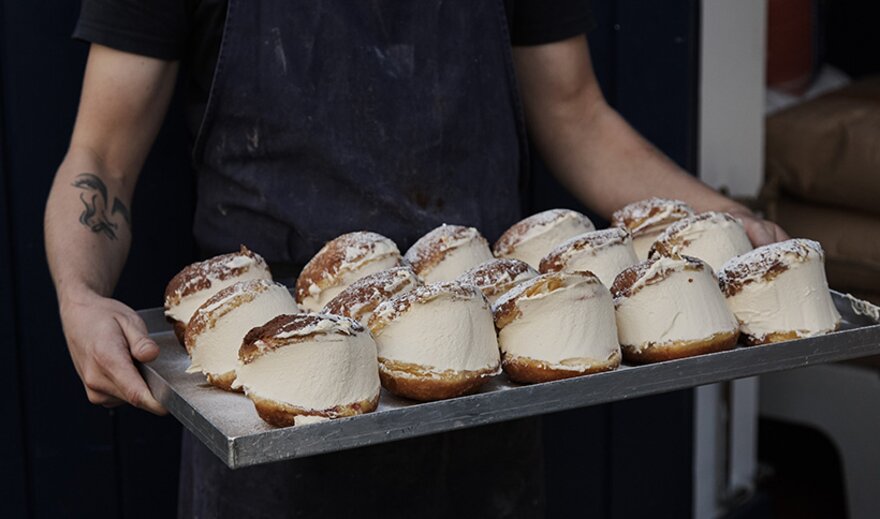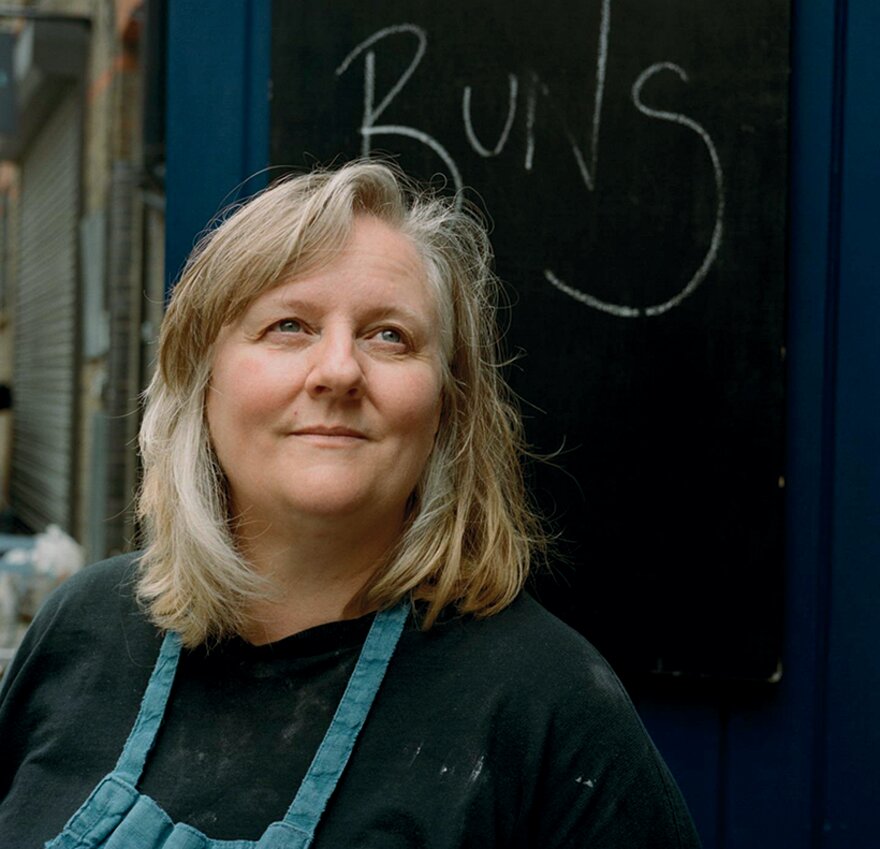Londoners are queuing round the block for Dee Rettali's flavourful fermented bakes at Fortitude Bakehouse, hewn from a career in organic baking. She talks to Caroline Baldwin
What sparked your interest in baking?
I come from a very long history of crafters – my father was in the dairy industry in rural Ireland and my mum was a pastry chef. I started out in hospitality in the early 1990s working with Justin de Blank [an upmarket delicatessen and restaurant in Belgravia, London]. One day I was told that I had to cover the pastry section and I almost ran away. Nobody wanted to be on pastry because you have to be incredibly patient and organised, it's far more science based and there isn't an immediate service element to it.
But I'm really glad I did it. I worked my way up to head pastry chef and then I wanted to try something different. At that time the organic industry was starting to boom, so I started working for an organic grocer and bakery called Bumblebee Natural Foods. The woman who owned the kitchen was really progressive and we did lots of fermentation and gluten-free recipes – this was more than 20 years ago, way before it was popular.
So the organic movement was important to you?
We did a lot of the groundbreaking work for people who are making these products now. I thought it was such a natural way of eating, using dried fruit and nuts rather than the pastes, jellies and colours that were common in pâtisserie.
I did a stage at bakery the Pudding Club, baking for the Dorchester and the Savoy, and shortly after that I set up a business called Patisserie Organic, a wholesale pâtisserie with concessions in Whole Foods Market and department store Harvey Nichols. I sold the business quite successfully as the movement began to become more popular.
We were always just a little ahead of the game – but somebody has to do it, and I'd rather it be me. I wouldn't copy what somebody else was doing, so it probably suited my personality.
How did you end up opening Fortitude?
I then worked at [London café and wine bar group] Fernandez & Wells for five years on the food development side. And when my partner, Jorge Fernandez, sold the business, we decided to continue working in hospitality because really, that's all we knew.
We started Fortitude Bakehouse six years ago in Bloomsbury in London. I had such a long history in food, and he had a long history in coffee, so we just went into business together. When it started, we were 70% wholesale and 30% retail, up until Covid, when wholesale completely stopped. That really knocked our confidence, and it took until last summer, when we got into TikTok and Instagram and finally had a bigger team, that the business began to grow again and I could feel the momentum.
You often leave your doughs to ferment before baking – how did this come about?
I love a story and I wanted to do something that reflects my background in Ireland, where my grandparents had a smallholding without any refrigeration. Fermenting cake comes from a purpose, and I wanted to bring that farming and natural background to London.
Having worked in the artisan bread industry for such a long time, I knew there are plenty of people who were already doing really good sourdough and croissants, and although I don't have anything against any of the bakers doing that, with what we do, you can't get it on the mass market. We slow-prove everything – we don't have a prover on-site – and I don't know anyone else that's doing it at the scale we are and with no prover.
What was your first fermented bake?
I like a challenge. I'd done lamination, hotel pâtisserie and the culinary arts, so one day I decided to make a fermented cake to see if it worked and it did. It was a polenta cake with yogurt as my starter, with olive oil and lemon, and it started bubbling within a few days. I also did a banana sourdough and the bananas' natural sugars ferment really quickly. The dough would bubble and when it was cooked the cake would come out as a big loaf and we'd be so excited until it would drop again. It took two years to get the chemicals and the quantities for that recipe right.
How does this baking style differ to traditional bakeries?
It's a very different process – I often have bakers who start work with me who have to relearn what they've been taught. Take the slow proving. Without a prover we have to keep everything in check – it's about planning, planning, planning. Because we don't have a machine that keeps the dough refrigerated and then flicks into prove mode for 20 minutes at 7am. We just have to know. And we only have three small ovens, but we manage and it just works.
If we were to open another site, maybe we'd get a prover in, but then we would lose a bit of the essence of who we are. Because our fermented brioche can't be fast-proved – the butter would seep out – the recipe is designed for slow proving, which is what makes us different.
A number of your bakes have caught the attention of social media – how did that happen?
Last year, an amazing woman came into the bakery and did an Instagram reel about our bakes and overnight we went viral – we had a following before, with occasional long queues, but this multiplied our sales by five. Our beignets are very popular – I grew up eating this fried dough in Ireland and to me it's a childhood bun. We make the dough, fry it and fill it with cream and people always want them.
What makes your beignets stand out?
The brioche dough for the beignets was developed in the six months before we opened. It's a very soft dough made with cultured butter, which gives it a tang. We make about 50kg of the dough every day and use it for sandwiches, morning buns and beignets – the different uses depend on how long we prove the dough. The beignet is proved for a really long time – you'd never see the connection between the raw dough and the bakes.
It's so helpful to be able to make one dough and then have lots of different things we can do with it. As a business it's very cost effective and I'm also zero-waste as much as possible, so we all work to that principle.
What else do your followers go mad for?
We did a Moroccan seaside doughnut in the summer, using our brioche dough again. It looks like a fat biscuit. We deep-fry it and it bubbles up and we then dip in syrup and serve it with ice-cream on top. It was so popular that some days we thought ‘why have we done this?'. People were coming from all over the world for it.
How do you cope when you have bakes that go viral? And how do your regular customers feel when they have to queue?
When something goes viral it helps in that we can build our coffers in the hope of getting through another year without having to ask for money from a bank or investor. But, of course, when we stop making those bakes – such as when we stopped doing the Moroccan seaside doughnut at the end of the summer – income drops off by 25%.
You always have to know your customer base. That said, my regular customers sometimes get pissed off by the queues. We have one guy, who is very dry, and I said to him last summer, "oh you've got a brilliant tan, where have you been?", and he replied: "Standing in the fucking queue outside Fortitude!". I thought that's the best thing I've heard! But we have very measured queues now. It feels normalised and we had to get back to that.
Your team is predominantly female. How did that come about?
We receive applications from all over the world, because people have recognised us as being something different. We have a 25-strong team and I think we have a lot of women applying because it's a woman-run bakery, but we also have a lot of non-binary people working for us. I think they feel comfortable here because we have a very good reputation for being a safe space. It's just about being nice to people and giving them a chance, really.
When you work here you get told very quickly that you know a lot because we train in a way where people can master something and that builds their confidence – and I think a lot of women in hospitality struggle with confidence and anxiety because it's a tough world. I've had a lot of chefs apply for jobs who tell me they've had enough of the restaurant industry and they just want to be somewhere where they're learning, making a living and feeling really comfortable.
What are your plans?
I'd like to open another site called Fortitude Eatery. My plan was never to have Fortitude bakeries all over London, as much as investors have offered us money to do so. It's tempting when you're on your knees, but I want to stick to our plan, which is Fortitude Bakehouse, Fortitude Eatery – with a bakery and space for sit-in dining – a Fortitude Wine & Food, and a Fortitude Camp or Farmhouse somewhere like Morocco where we could set up trips. If we hadn't had two years of Covid bullshit we'd be much further along, but we're looking for a site for the Eatery at the moment.
From the menu
- Guinness cake with buttercream and Guinness caramel
- Moroccan honey and almond tart
- Strawberries and cream sugar buns
- Blackcurrant and vanilla cream scone
- Marrakech blue tea and apricot scone
- Feta and za'atar scone
- Choux fritter with apple syrup cream
- Beignets with brownie cream and banana caramel
Dee Rettali's CV
- 1992-1995 Worked at grocers and restaurant Justin de Blank across all areas of the kitchen, specialising in pâtisserie.
- 1995 Head baker at Bumblebee Natural Foods, while also doing a part-time stage at the Pudding Club and taking a culinary arts programme at Westminster Kingsway College.
- 1998 Set up Patisserie Organic as a wholesale pâtisserie with concessions in Whole Foods Market and Harvey Nichols. Sold the business.
- 2004 Worked as a consultant for various hotels and restaurant groups
- 2011 Took on the general management of Fernandez & Wells restaurant group, founded by partner Jorge Fernandez and Rick Wells in 2007. Sold the business in 2019.
- 2018 Established Fortitude Bakehouse
Continue reading
You need to be a premium member to view this. Subscribe from just 99p per week.
Already subscribed? Log In












